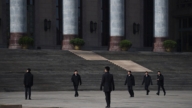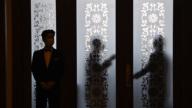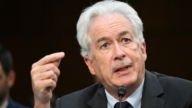【新唐人2013年02月25日讯】由于西藏的经济环境日益改变,如今,基督教对西藏的影响,比历史上任何时候都要大。英国《卫报》2月22号发表调查报导说,中共政府有意容忍基督教在西藏的传播。由于中共长期以来对宗教及信仰团体实行的是打压与迫害政策,国际社会质疑中共容忍基督教传播的背后用心。下面请看本台记者的报导。
据《卫报》记者乔纳森•凯曼调查,约有400名外国人居住在西宁,其中多数都是传教士。《卫报》评论说,中共政府可能欢迎基督教传教士作为藏传佛教的一种“反作用力”。
接受乔纳森采访的10多名人士认为,中共政府这样做的原因,可以说用心险恶。
文章说,其中一个原因在于,传教士是对当地经济的福音。因为这些人要嘛从事利润丰厚的生意,要嘛在当地学校几乎不计报酬的教学,靠外国捐献补贴微薄的薪酬。报导还说,中共当局在政治上信任传教士。传教士不愿公开批评区域政策,以避免阻碍他们的精神使命。
“达赖喇嘛西藏宗教基金会”董事长达瓦才仁:“他(中共)这样做的目地是可能想制衡藏传佛教,因为西藏人的佛教意识很强。基督教在西藏各地都办了很多的学校,而且只招收孤儿,让这些孤儿和外面的世界基本上处于隔绝状态。”
“达赖喇嘛西藏宗教基金会”董事长达瓦才仁也注意到,从政治上西藏人觉得西方会比较支持西藏,所以对这些外国人较为友好,因此,只要不批评藏传佛教,很多基督教传教士在西藏办的学校还是生存了下来。
《卫报》的报导,还引述了美国“哥伦比亚大学”西藏问题专家罗比•巴尼特的话说,传教士现象颠覆了西方对西藏的标准看法。以前西方社会有意保护正在被中共政府破坏的西藏宗教。但现在,那些在西藏的外国传教士的目地正好相反,他们想要用自己的宗教代替西藏的宗教。
达瓦才仁:“刚开始他们讲耶稣怎么好的时候,藏人也无所谓,然后他们就开始说藏传佛教怎么不好的时候,藏人就觉得不舒服,所以很多就开始退学,但是这个时候中国(共)政府一般都是会保护学校。如果你办的是藏文学校,只要稍微出点事,中国(共)政府马上就会关闭藏文学校。而且藏文学校要有一些诵经,念经的行为,他们就会说传播迷信思想,他马上就会关闭。”
1949年毛泽东宣布西方传教士是“精神侵略者”,并将他们驱逐出境。之后,“传教”在中国被视为非法。但令人奇怪的是,现在中共当局对西方传教士却表现出“选择性的容忍”。
达瓦才仁:“中国(共)政府还是很喜欢那种有人对藏传佛教唱反调,不喜欢藏传佛教的一些思想或势力。特别是一些国外的势力进入。中国(共)政府对他们(外国传教士)肯定是保护的,而且这些人拒绝跟藏人谈政治,甚至如果有些事情他们还是比较倾向于寻求中国(共)政府的帮忙和保护。”
近年来,为抗议中共的宗教政策,“藏人自焚事件”频发,引起国际社会强烈谴责。2月19号,又有两名青年藏人自焚,使得自2009年以来,青海等地自焚的藏人人数上升到104人。
华府中国问题专家章天亮:“所以说共产党不会允许任何一个独立的信仰存在的,不管是藏传佛教也好,天主教,地下教会,基督教家庭教会,或者是法轮功,反正是你只要信仰,独立于共产党之外,共产党他肯定是要镇压的。”
华府中国问题专家,“乔治梅森大学”客座教授章天亮认为,共产党决不能容忍任何一种宗教在民间的影响力超过共产党,即使这种有意容忍基督教在西藏的传播,也是为了共产党维持自己的政权,如果这种传播一旦影响到中共政权,或者说他在民众心目中的地位超过共产党,共产党一定会出手镇压他们。
易如/采访 编辑/许旻 后制/萧宇
Christianity Spread Intentionally and Tolerated in China
Today, Tibet has seen western Christians more influential
than at any time in history.
UK’s The Guardian published a report, indicating that
the Chinese Communist Party authorities intentionally tolerate the Christianity spread in Tibet.
Over decades, the CCP has been infamous for its repression
and persecution of religious and belief groups.
Thus the international community is suspicious of
the motives behind this official action.
UK’s Guardian reporter Jonathan Kaiman pointed out that
“Of the 400 foreigners living in Xining, most are missionaries.”
The article quoted interviewees’ comments that
the CCP authorities “may welcome them as a powerful
counterforce to Tibetan Buddhism”.
Kaiman interviewed over 10 people for his article.
They said that the reason for the CCP authorities’ tolerance
“ranged from pragmatic to borderline sinister.”
“One is that they are a boon to local economies – they open
lucrative businesses and teach at local schools for next to nothing,
supplementing their meager salaries with donations from home.”
Furthermore, “Authorities may also consider missionaries politically
trustworthy, reluctant to undermine their spiritual missions by openly criticizing regional policies.”
(Chairman, Tibet Religious Foundation) Dawa Tsering:
“The CCP may use it to counterbalance Tibetan Buddhism,
as Tibetans have a strong Buddhist faith.
Christian missionaries have run many schools across Tibet,
which only accept orphans.
So these orphans are living basically in a state of isolation
from the outside world.”
Dawa Tsering remarks that the Tibetans feel the
West supports Tibet politically, so they are quite friendly towards the foreigners.
He said as long as local Christian schools do not criticize
Tibetan Buddhism, they have a chance of survival.
The UK report cited Robbie Barnett,
a leading Tibet expert at Columbia University.
He said that “the missionary phenomenon overturns
the standard notion of western attitudes towards Tibet
that western society is intent on protecting Tibetan religion,
while the Chinese government is more concerned
with dismantling it."
Barnett said, “If you look at the foreigners there,
they are people whose commitment is to the opposite –
it’s to replace Tibetan religion with their own religion."
Dawa Tsering: “Incipiently, they said how good Jesus is,
the Tibetans didn’t care.
Later, when they spoke against Tibetan Buddhism,
that annoyed the Tibetans who began to drop out.
But at that stage, the CCP authorities would stand
on the side of the schools.
When similar cases came up with local Tibetan schools,
the CCP would immediately shut them down.
Local Tibetan schools have courses for
chanting Buddhist scriptures.
The CCP label it as spreading superstitions,
and close the school right away.”
Mao Zedong tagged western missionaries as “spiritual
aggressors” and deported them.
The spread of religion has been illegal in China since 1949.
However nowadays, the Chinese authorities are
“selectively tolerant” of missionaries.
Dawa Tsering: “The Chinese government likes to play the
devil’s advocate against Tibetan Buddhism.
It dislikes the thought or influences of Tibetan Buddhism,
in particular, it dislikes the inflow of foreign influence.
The CCP definitely protects those foreign missionaries,
as they don’t talk politics with local Tibetans.
On some issues, they are even inclined to seek help
and protection from the CCP authorities.”
In recent years, Tibetan self-immolations have continuously
Taken place in protest at the CCP’s religious policy.
On February 19th, two more young Tibetans self-immolated,
the figure has risen to 104 since 2009.
(Expert on China, U.S.) Zhang Tianliang: “The CCP doesn’t
really allow for the existence of any independent religion.
No matter whether it’s Tibetan Buddhism, Catholicism,
Christian Family Church or Falun Gong.
It’s a fact that the CCP represses any belief that is
independent of communist ideology.”
The CCP never tolerates any religion that has greater
influence in civil society, says Zhang Tianliang.
He indicates that the CCP is selectively tolerating the spread
of Christianity, since it does not challenge it’s rule.
Once the spread of spiritual influence affects the
regime, or interferes at the civil level,
it’s propagators and missionaries
will become crackdown victims.

























